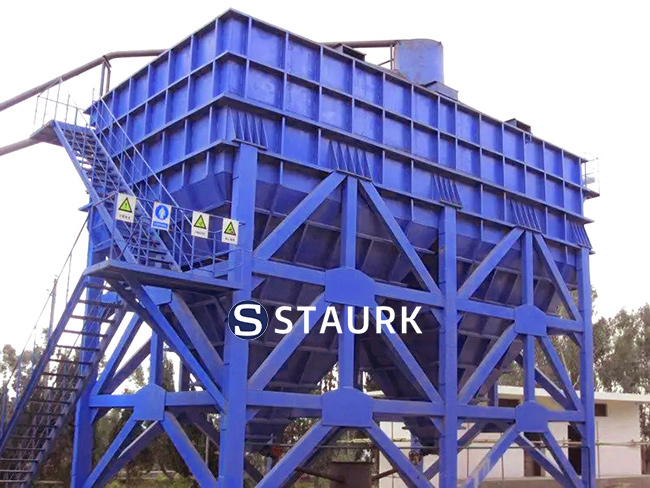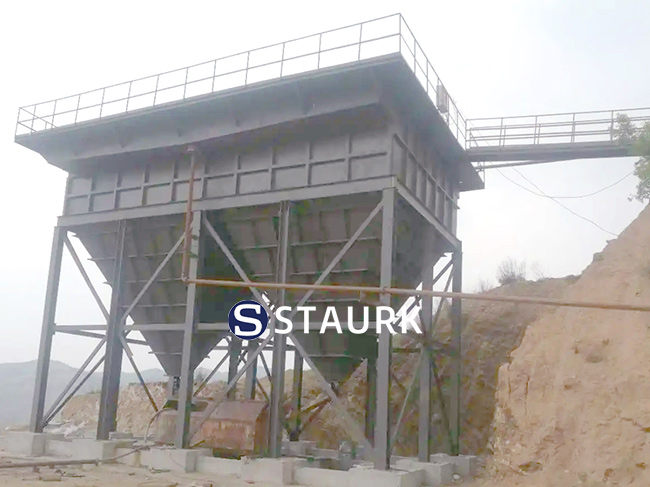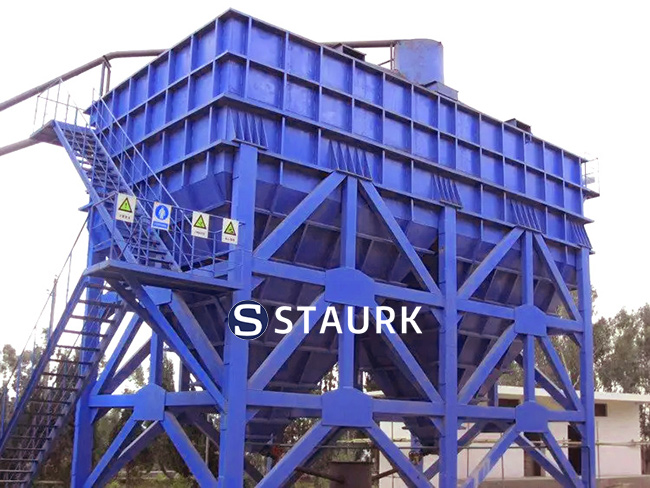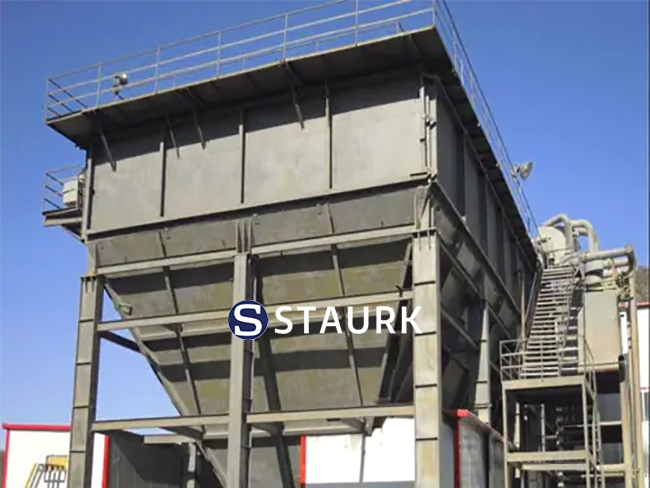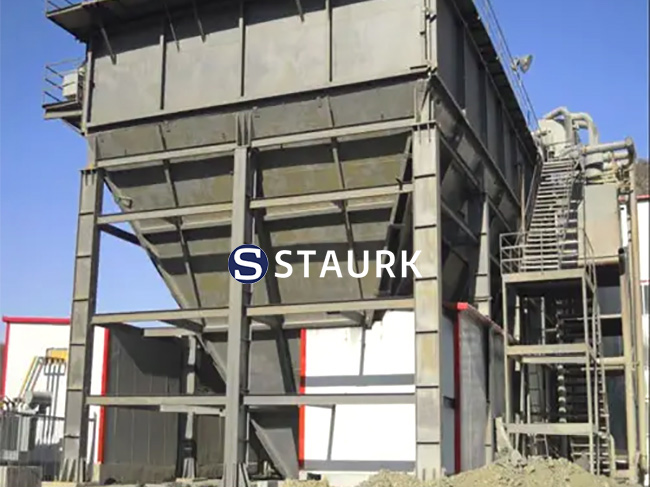Inclined plate settler also called inclined plate thickener, IPS, inclined plate sedimentation tank, inclined plate clarifier etc. Inclined plate settler is a product developed on the basis of digesting foreign advanced technology. The settling area on the available bottom area is maximized by using inclined sheets arranged in parallel. It has the advantages of small volume, large settlement area, large processing capacity, compact structure and reliable operation.
Application
It is mainly used for clarification and concentration of tailing, and can also be used in other industries to process various slurry containing solid particles.
Structure features:
1. Small size, large settlement area and large processing capacity, its floor space is only 1/10 of that of ordinary thickeners
2. The overflow water is clear and the underflow concentration is high
3. The side feeding method and the closed feeding pipeline are adopted to avoid the interference of the feeding on the clarification and concentration process of the pulp
4. The level and height of the overflow tank can be adjusted to ensure the same amount of pulp entering each inclined plate
5. The length of the inclined plate is long and the spacing is small, which not only increases the settlement area, but also ensures the effect of settlement
6. The transmission system realizes the slow rotation of the rake, automatic or manual lifting of the rake
7. Compact structure and reliable operation.
Principle:
The settling area on the available bottom area is maximized by using inclined sheets arranged in parallel.
The inclined plate thickener is mainly composed of two upper and lower boxes. The upper box contains a thin layer inclined plate with an inclination of 55°, and the lower box is a cone or column-shaped sludge hopper.
The pulp enters the thickener vertically from one side of the upper box, and then enters the gap of the inclined plate through the conical inlet.
The pulp is clarified in inclined plates above the inlet position, so that the clarified liquid does not mix with the incoming pulp.
There is a full-length overflow tank above each set of inclined plates, and an orifice is opened at the bottom of the tank, which can cause hydraulic back pressure of the feed flow. This feeding control method can ensure that the slurry enters each thin plate settling chamber uniformly, and can minimize the turbulent flow of the slurry at the feeding port.
The solid can first settle on the inclined plate, then slide along the inclined plate to the ore hopper, and then use the rake system to make the solid particles settle further in the ore hopper.
Divided into LT, LTS, LTK and so on.
Parameter
| Num | Name | Parameter | ||
| 1 | Precipitation area | 500 ㎡ | ||
| 2 | Tilt plate angle | 55° - 65° | ||
| 3 | Volume | 149 m³ | ||
| 4 | Pulp passing capacity | 400 m³/h | ||
| 5 | Rake speed | 0.29 r/min | ||
| 6 | Raising rake speed | 115 mm/s | ||
| 7 | Lifting rake stroke | 300 mm | ||
| 8 | Cycloid reducer | Model | X0.75 - 84 | |
| Speed ratio | 1505 | |||
| Power | 0.75 kw | |||
| 9 | Electricity - hydraulic push stick | Model | IPS 3000 - 90 | |
| Stroke | 300 mm | |||
| Pull | 25000 n | |||
| Push | 30000 n | |||
| Pull speed | 15 mm/s | |||
| Push speed | 90 mm/s | |||
| Motor | Model | Y100L2-4 | ||
| Power | 3 kw | |||
| Voltage | As customer requirement | |||
More Introduction
The box, mud bucket, inclined plate group and rake are all heavy-duty devices, and the rake lifting mechanism is an option.
The ratio of clarifying area and concentration area can be optimized through this specially designed feed inlet position
No slurry short circuit or surface turbulence
The flocculation tank is integrated with the variable speed agitator
low installation cost
Can be delivered as a whole or as prefabricated components
Small size of equipment
Small footprint
Square profile for easy planning and construction
High adaptability for factory renovation or expansion:
Can be installed on any system
Easy to reposition, suitable for process modification
Easy on-site installation
Short line
Mounted high for easy gravity feed to downstream processes
easy to regulate
Under internal volume and surface area
Easy thermal insulation and protection against toxic fumes
Lowest evaporative loss
Simple steel plate and standard configuration
Dedicated materials and finishes for easy combination
Easy maintenance
The shell of the inclined plate box thickener is made of thin steel plate, the upper part is rhombus, and the inclined plates arranged in parallel are installed inside;
During operation, the pulp is fed to the middle of the inclined plate through the narrow groove along the entire width of the box, and then flows upward through the thickening plate.
The clarified liquid is discharged from the upper overflow tank, and the sediment is deposited from the concentration plate and slides down.
Deposited into the lower pyramidal box.
Then it is discharged from the discharge pipe at the bottom.
The working principle of the inclined plate thickener is the same as that of the traditional thickener. It uses gravity sedimentation to separate the solid particles in the pulp, but the sedimentation occurs in the cavity between the inclined plates in the equipment. The distance between the plates is very small, and the fluid is easy to form laminar flow, and the solid particles only need to settle for a small distance to fall on the plate, and then slide down the inclined plate, so the effective settlement area is ten times the original area of the equipment. The shell of the inclined plate box thickener is made of thin steel plate, the upper part is rhombus, and the inclined plates arranged in parallel are installed inside;
During operation, the pulp is fed to the middle of the inclined plate through the narrow groove along the entire width of the box, and then flows upward through the thickening plate.
The clarified liquid is discharged from the upper overflow tank, and the sediment is deposited from the concentration plate and slides down.
Deposited into the lower pyramidal box.
Then it is discharged from the discharge pipe at the bottom.
The working principle of the inclined plate thickener is the same as that of the traditional thickener. It uses gravity sedimentation to separate the solid particles in the pulp, but the sedimentation occurs in the cavity between the inclined plates in the equipment. The distance between the plates is very small, and the fluid is easy to form laminar flow, and the solid particles only need to settle for a small distance to fall on the plate, and then slide down the inclined plate, so the effective settlement area is ten times the original area of the equipment
